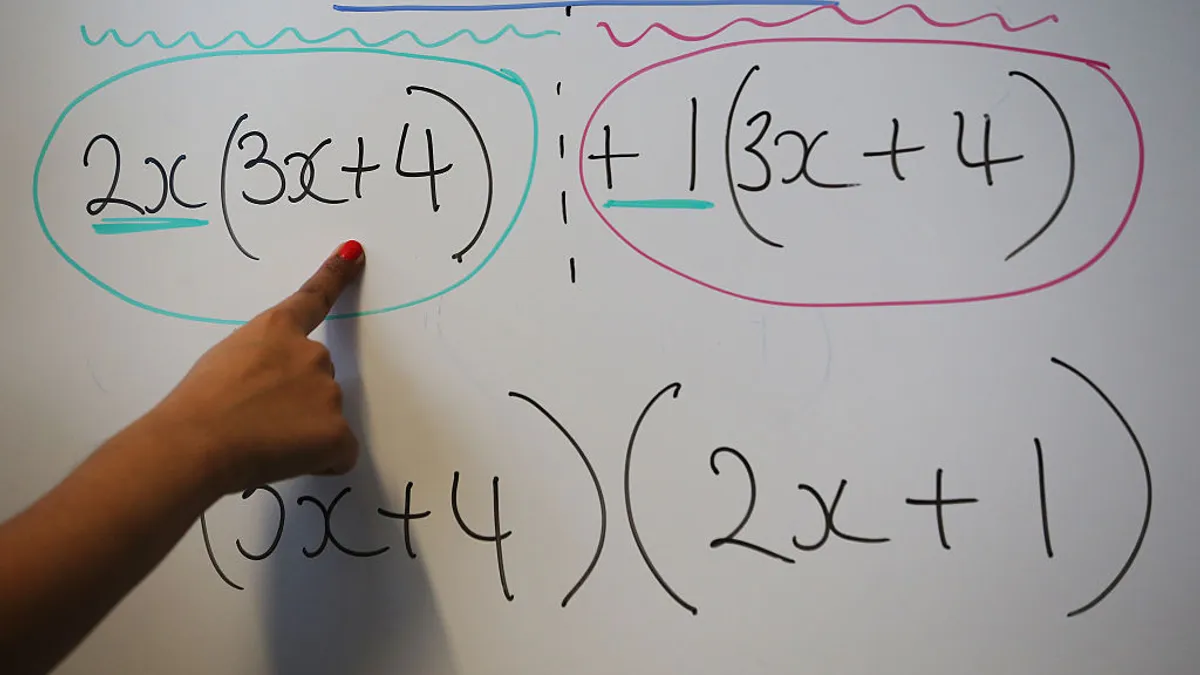UPDATE: April 21, 2022: After K-12 Dive asked the Florida Department of Education for examples of math materials that violated state restrictions and standards, department spokesperson Cassandra Palelis said, "The content is copyrighted and we are unable to release it to the public at this time, pending review." However, the department publicized examples submitted by the public, which included graphs on racial prejudice and lessons that included social-emotional learning as part of their objective. "These examples do not represent an exhaustive list of input received by the Department," the department said in a disclaimer.
Dive Brief:
-
The Florida Department of Education announced last week that it rejected 54 submitted math instructional textbooks after a "thorough review of submissions."
-
Out of the 54 that were not included in the final list of textbooks, 42 were rejected by the department because "they incorporate prohibited topics or unsolicited strategies" including critical race theory, or both contained CRT and did not align with the state's standards.
-
Overall, this year saw the largest percentage of instructional materials the department has rejected to date, with the highest percent of rejected textbooks falling in grades K-5, according to the state department.
Dive Insight:
"When it comes to education, other states continue to follow Florida’s lead as we continue to reinforce parents’ rights by focusing on providing their children with a world-class education without the fear of indoctrination or exposure to dangerous and divisive concepts in our classrooms," said Education Commissioner Richard Corcoran in a press release.
In its announcement, the department did not provide examples or excerpts of materials that it found violated CRT policies.
The department also cited a memo sent in June 2021 "advising publishers and school districts to not incorporate unsolicited strategies, such as social emotional learning and culturally responsive teaching."
"It is unfortunate that several publishers, especially at the elementary school grade levels, have ignored this clear communication and have attempted to slip rebranded instructional materials based on Common Core Standards into Florida’s classrooms," the department said, "while others have included prohibited and divisive concepts such as the tenants of CRT or other unsolicited strategies of indoctrination – despite FDOE’s prior notification."
The public decision to reject 41% of submitted math textbooks, a bulk of which were rejected due to CRT or other "unsolicited strategies", also comes after the state Board of Education banned critical race theory from classrooms last year.
A similar effort is being pushed by Florida lawmakers in the Stop the Wrongs to Our Kids and Employees (WOKE) Act, which would codify the CRT ban into law and would also restrict how workplaces approach diversity, equity and inclusion training.
That bill passed the Florida legislature in late March and is strongly supported by Gov. Ron DeSantis, who proposed the legislation.
While Florida's efforts have made headlines, a slew of other conservative states have also followed suit in banning critical race theory, which is often an umbrella term used to describe discussions of systemic racism.
According to a tracker compiled by The Heritage Foundation and last updated on April 8, at least 11 states currently have legislation banning CRT. Another five states have legislation pending, and an additional eight have legislation introduced.






 Dive Awards
Dive Awards






